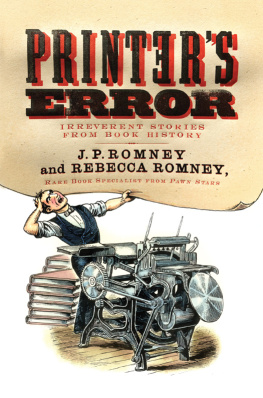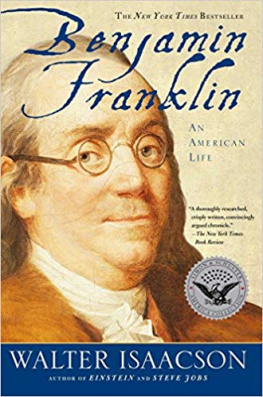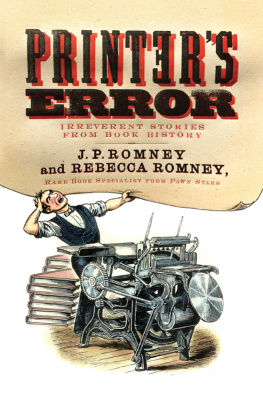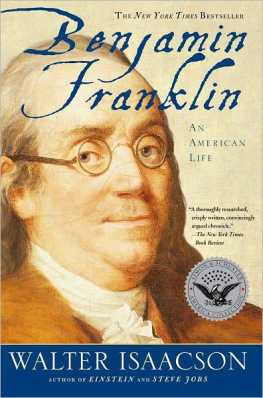Posterity it seems has to soften and make respectable, smooth and polish, unable to see that the rough, the raw, the discordant, may be the source and nurse of creativity.
Transgression is one of the historians most useful data, for the pointed figure of the scandalized is often our index of the norm.
THIS IS AN IRREVERENT HISTORY. Sure, to most of us, a history about the printed word sounds dignified. After all, the printing press has recorded and spread some of the greatest achievements of humankind. But remember, humankind is also full of idiots. Ridiculous decisions, weird coincidences, and absurd stories are no strangers to our species. The history of the printed word reveals our capacity for brilliance, but it also reveals our capacity for blunder. The printing press is a stage upon which the entire drama of human thought and morality is acted out. At times thats the delight of Beatrix Potters The Tale of Peter Rabbit; at others, its the adamantine weight of James Joyces Finnegans Wake. Sometimes the ideals are as enlightened as John Miltons Areopagitica, and at other times theyre whatever the hell Fifty Shades of Grey is.
Human civilization is all the richer for the bizarre history of printed books. Our mistakes, our provocations, and our mysteries are all valuable in their own ways. Our predecessors who lived hundreds of years ago are not so different from us, and we cant help but laugh in recognition of our shared folly. Take the 1631 printing of the Bible in English, the infamous Sinners Bible. The printer, Robert Barker, owned the exclusive privilege to print Bibles in London. His greatest triumph was the first edition of the King James Bible (1611). If youre able to find one today, you can expect to pay one hundred to two hundred thousand dollars (or more) for it. Near the end of Barkers career two decades later, he produced one thousand copies of the Holy Book without a very close proofread. While most typos are innocuous, others lead to trouble with the law. In setting the type for Barkers sinful Bible, a compositor somehow forgot a key word in the seventh of the Ten Commandments. Thou shalt not commit adultery became Thou shalt commit adultery. When this mistake was caught, Barker and a colleague were summoned to a legal hearing at the order of King Charles I. They escaped with only a hefty fine, but copies of the Bible were seized wherever they were found, and destroyed. Partially because of the scarcity, today a copy of this Wicked Bible can fetch well into the tens of thousands of dollars at auction. Modern collectors appear as amused by the error as the the eighteenth-century owners who went out of their way to save their copies for posterity.
People like to push, to test boundaries. Scandal and amusement are two of the most glorious strands woven into the tapestry of the printed word. Take one of the masterpieces of American childrens literature, The Adventures of Huckleberry Finn, by Mark Twain. Published in 1885, Twains masterpiece has everything a reader could ever want: adventure, humor, controversy, tenderness, the hypocrisy of competing social class structuresand a penis.
Most people agree that exposed adult genitalia are not something you should normally encounter in childrens literature. Yet according to the first printed copies of Huckleberry Finn, Uncle Silas did not agree with most people. Mark Twain didnt intend his farmer/preacher character to be a sex offender, but in the weird world of print, mistakes (or, in this case, pranks) happen. During the printing, the innocent illustration of Uncle Silas was altered without Twains knowledge to appear as if Silas were proudly displaying his erect phallusa phallus that, in order to pass unnoticed at a casual glance, had to be the size of a mealworm.
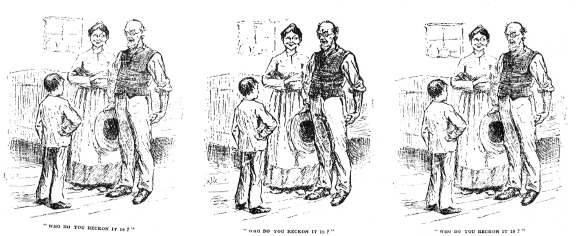
THE INFAMOUS UNCLE SILAS ILLUSTRATION IN ITS THREE STAGES: THE CURVED FLY (BEFORE), THE DEFACEMENT, AND THE STRAIGHT FLY (AFTER). Image used with the kind permission of Kevin Mac Donnell Rare Books.
Despite a five-hundred-dollar reward (more than twelve thousand dollars in todays currency), we still dont know exactly which of the fifty pressmen working on Huckleberry Finn vandalized the printing plate. In the original illustration, which depicts Huck Finn presenting himself in Uncle Silass home as his distant nephew, Silas stands with his pelvis jutting out in an exclamation of dramatic confusion. Aunt Sally hovers nearby with a half-smile, as if she suspects whats really going on. And young Huck has his hand on his hip, thinking of how to respond to the old mans line of questioning.
With a few scratches into a printing plate, however, the scene took on a markedly different feel. In the altered sketch, Aunt Sally has a disturbing grin on her face, Huck appears to be silently processing the obscenity, and Uncle Silas looks an awful lot like he is gesturing to his tiny exposed member over a caption that reads: Who do you reckon it is?
One might suppose that the greatest American humorist would have seen the lighter side of this little printing debacle. Mark Twain did not. The famed author immediately had the illustration stripped from all copies, and book agents selling subscriptions door-to-door were ordered to tear out the page from their display copy. Although no copies containing the hilariously offensive Uncle Silas illustration made it into the hands of the public at large, some agents inevitably bucked Twains orders, and the drawing ended up displayed in the offices of a few publishers.
Fixing the penis debacle cost Twain a tremendous amount of money and delayed the books release beyond the 1884 Christmas season. Today we read the phrase published in 1885 and dont realize the small shit storm that changed the books publication date from 1884. Modern rare book dealers always note the state of Uncle Silass fly in their descriptions of the first-edition copies of Huckleberry Finn, which sell for thousands of dollars.
We love exploring the darkly comic lining to history. Admittedly, this can sometimes be a challenge. For example, here is an iconic line from Dostoyevskys masterpiece Notes from Underground: Im certain that man will never renounce real suffering... why, this is the sole cause of consciousness. Russia is not a funny place. Just ask the Soviet-born comedian, Yakov Smirnoff: Many people are surprised to hear that we have comedians in Russia, but they are there. They are dead, but they are there. If Smirnoff can find humor in the USSR, we figure finding humor in the history of the printed word cant be that hard, right? Whether its a fifteenth-century German inventor short on money or a London engraver talking to ghosts three centuries later, people are people, and part of being people is doing bat-shit crazy things.
Take that inventor from Mainz. Nearly everyone recognizes the name Gutenberg, but what do we really know about him? Shockingly little. Gutenberg may have invented the printing press in the West, but he didnt print anything about himself. In fact, for hundreds of years, the European inventor of one of mankinds greatest innovations was unknown to the world. In contrast to these painful gaps in the historical record, we have a wealth of material about one Johannes Trithemius, a Benedictine monk who campaigned

